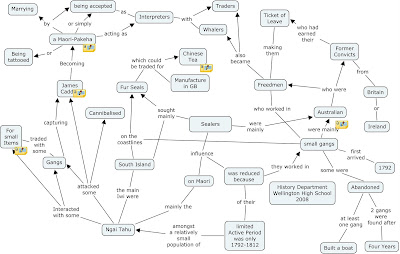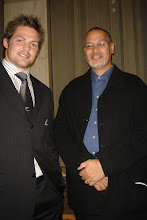God also came to New Zealand through Australia. By 1808, missions founded in Tonga, Tahiti and the Marquesas had all collapsed. Pacific evangelism was revived by the Anglican Chaplain of New South Wales, Samuel Marsden, 'the Saint Augustine of New Zealand'. Frustrated by the Pacific failures and by his efforts among Australian convicts and Aboriginals, he turned with hope and relief to the Maori. Marsden and allies such as John Nicholas, author in 1817 of the first major book on New Zealand, tirelessly argued that Maori were the perfect prospects for conversion - despite their reputation for aggressiveness and cannibalism, and the almost total absence of converts until 1830. Confidence in Maori convertibility was not restricted to rhetoric. The Church Missionary Society (CMS) gave prospective missionaries to New Zealand two years' training, as against three for India. Trainee missionaries practised on Catholic Irish in London, only to be threatened with red-hot pokers and bricks through church windows."
Marsden set up the first mission station at Rangihoua, in the Bay of Islands in 1814, and supervised operations from his base at Parramatta, near Sydney, until his death in 1838. The CMS had established three stations at the Bay of Islands by 1823, when Henry Williams, an able and energetic ex-naval officer, if somewhat narrower in outlook than Marsden, took up the local leadership. The same year, the CMS was joined by the Wesleyan Missionary Society, whose Reverend Samuel Leigh established a station at Whangaroa. This station was abandoned in 1827, but the Wesleyans were re-established at Hokianga the following year, and between 1830 and 1836 were led by the choleric and colourful William White. The CMS and the WMS formed an uneasy cartel, with the former as senior partner, and the latter allocated the western coast. Neither mission broke out of Northland until 1833, but the number of stations exploded in the mid-1830s. In 1839, CMS missionaries and their families numbered 169; WMS 37 .By 1845, the WMS had a dozen small stations, and the CMS two dozen, some large, unevenly spread across the country. The Anglican-Methodist alliance was seldom comfortable, but both were united in their dislike of Catholics - they would rather the Maori stayed pagan than become Papist. The first Roman Catholic mission station was established in 1838, by Bishop Jean Baptiste Pompallier. Catholicism came late but fast, backed by the new Marist organisation in France and, at first, by substantial funds. By 1844, it had brought 41 French missionaries to New Zealand and established a dozen mission stations.
It is often as difficult to empathise across times as it is across cultures. From some modern perspectives, the evangelicals are hard to like. They dressed like crows; seemed joyless, humourless and sometimes hypocritical; they embalmed the evidence poor historians need to read in tedious preaching, in which the love of God was often dwarfed by the fear of sin. Marsden forbade his daughter to read novels, and showed a certain lack of human sympathy. 'Mrs. Hill is very low spirited and a few days ago she cut her throat - and has not been able to swallow anything since.' He provided a curious reference for a New South Wales boy named William Evans: I do not know him - if he had been bad I should have known him."' In Australia, he was known as the 'Flogging Parson', for good reason. He faced repeated accusations of corruption - of using his official position, the moral high ground of evangelism and his privileged access to the New Zealand trade to feather Parramatta. He did make a lot of money - £30,000 to be precise - and despite the indignant denials of subsequent biographers, it is tempting to see fire in the smoke. But he also spent a great deal of his own money on the New Zealand mission, as well as two years of his own time, and seven voyages at great personal cost - he was always extremely seasick. It is difficult not to admire him and his fellows. The New Zealand missionaries, men and women, spent their lives on the psychological equivalent of a fearsomely alien planet for something else's sake. They buried their children, braced their shoulders and served their God. Perhaps it was years in purgatory in this world exchanged for years off purgatory in the next, but the mean-spirited can find self-interest in every altruism.
Satan surrounded the early missionaries in the form of naked Maori bodies. Marianne Williams spent her first night in New Zealand thinking of them. 'The tall muscular forms of the New Zealanders flitted before my mind's eye, whenever I endeavoured to sleep. ` Missionary women are not known to have succumbed to temptation, but some of their menfolk did. They included William White, William Colenso, Charles Creed and Thomas Kendall, and in at least the last case sex was not the only temptation. As on other islands and beaches of the Pacific, fear of sin competed with the seductions of sinlessness, and it was not always dear which would convert which. The 'apparent sublimity' of Maori religious ideas, wrote Kendall in 1822, has 'almost completely turned me from a Christian to a Heathen'. This battle also raged in the soul of the CMS missionary William Yate. His influential book on New Zealand, published in 1835, portrayed Maori as 'neither too ignorant nor too savage to be made the subjects of the saving and sanctifying influence of the gospel', but as pretty ignorant and savage all the same. Maori mothers fed their infants pebbles to harden their hearts. thought 'it is not true that Maori mothers eat their own children. This is too horrible even for them. 'Poor Mr Yate' was subsequently sacked for alleged sexual relations with between 50 and 100 young Maori males. The Catholics maintained their chastity or their secrets, but the British missions always struggled against reverse conversion. Children and single men were considered especially vulnerable to Maoriness. Marsden reproved Kendall for leaving his eight children to visit England 'at an Age when they in a very special manner require the Eye of the Parent, to prevent them from mingling amongst the Heathens and learning their ways' As early as 1811, he wrote: 'Never upon any Account send a single man out. But some went.
We should not deride the missionaries' efforts, or sneer too hard at their self-defined failures, but we should equally avoid accepting their account of their own impact, which claimed the wholesale religious conversion and partial 'civilisation' of Maori by the 1840s. Even when their interpretation of results is not accepted, they are still often portrayed as the main agents of contact, largely because they dominated the written record. In 1990, an academic biographer claimed that Marsden 'transformed the Maori economy and laid the foundations of New Zealand agriculture'. that he at least greatly hastened a Maori religious conversion, and that the British intervention that saved New Zealand from 'anarchy' was 'in large measure due to the apostolic labours of Samuel Marsden" Marsden was important, but this overstates the case. Missiology and hagiography are still too closely related.
Making Peoples
James Belich
Pp 134-137
 In 1831 Yate persuaded 13 northern chiefs to sign the “Letter to King William.” This petition sought British protection from the French. It seemed that the good Mister Yate used the arrival of the French ship ‘la Favourite’ to stir up the Chiefs into believing that France was about to annexe New Zealand and would take the opportunity to take revenge for the murder of Marion du Fresne some 40 years earlier… as it turns out the French ship was simply continuing their tradition of scientific research and left without doing much at all.
In 1831 Yate persuaded 13 northern chiefs to sign the “Letter to King William.” This petition sought British protection from the French. It seemed that the good Mister Yate used the arrival of the French ship ‘la Favourite’ to stir up the Chiefs into believing that France was about to annexe New Zealand and would take the opportunity to take revenge for the murder of Marion du Fresne some 40 years earlier… as it turns out the French ship was simply continuing their tradition of scientific research and left without doing much at all. The Flag chosen in 1834 was negotiated by Busby and a number of Northern Chiefs. Its design was one of three presented to them. When it was gazetted by the Admiralty it again reinforcedthe view of New Zealand as an independent state.
The Flag chosen in 1834 was negotiated by Busby and a number of Northern Chiefs. Its design was one of three presented to them. When it was gazetted by the Admiralty it again reinforcedthe view of New Zealand as an independent state. In the meantime Baron De Theirry had arrived in the North causing a mild panic amongst some, apart from Busby who sent off a number of wild letters to the Governor and the Colonial office concerning an imminent takeover by the ‘King’ of New Zealand. Luckily for Busby the Nga Puhi of the Hokianga were less than impressed with the Frenchman’s claims to 40,000 acres (sold to him in 1820 by Hika) and allowed him only a few hundred. His French settler promptly rioted and left. Poor old De Theirry ended his days as a piano teacher in Auckland.
In the meantime Baron De Theirry had arrived in the North causing a mild panic amongst some, apart from Busby who sent off a number of wild letters to the Governor and the Colonial office concerning an imminent takeover by the ‘King’ of New Zealand. Luckily for Busby the Nga Puhi of the Hokianga were less than impressed with the Frenchman’s claims to 40,000 acres (sold to him in 1820 by Hika) and allowed him only a few hundred. His French settler promptly rioted and left. Poor old De Theirry ended his days as a piano teacher in Auckland. There was also growing French interest in Akaroa and Busby continued to bombard the Colonial Office with letters of annexation in the south. Not only were the French a colonial threat but the large numbers of American whalers and the appointment of an American Consul (Clendon) was also a matter of concern.
There was also growing French interest in Akaroa and Busby continued to bombard the Colonial Office with letters of annexation in the south. Not only were the French a colonial threat but the large numbers of American whalers and the appointment of an American Consul (Clendon) was also a matter of concern.















